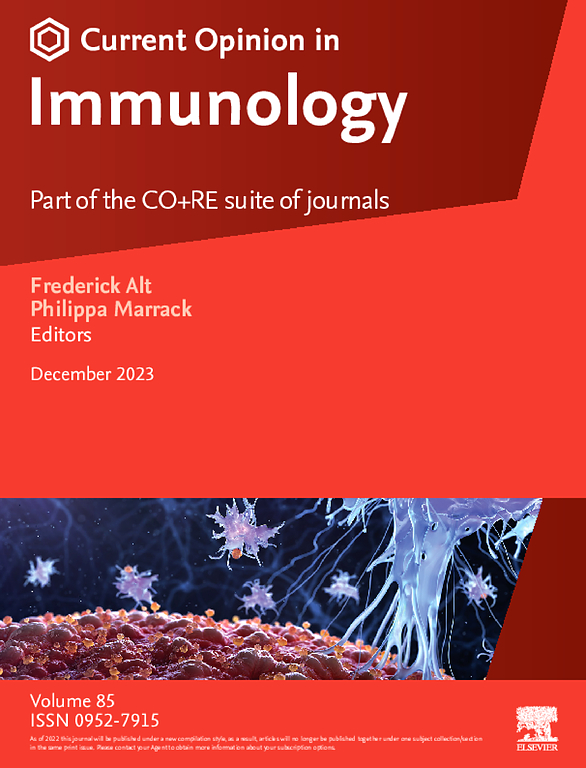Approved and emerging therapies for glucocorticoid-refractory chronic graft-versus-host disease
IF 5.8
2区 医学
Q1 IMMUNOLOGY
引用次数: 0
Abstract
Glucocorticoid-refractory chronic graft-versus-host disease (glucocorticoid-refractory cGVHD) remains a major barrier to long-term survival and quality of life following allogeneic hematopoietic stem cell transplantation (allo-HSCT), affecting 30–70% to half of patients with chronic GVHD who fail corticosteroid therapy. In recent years, the Food and Drug Administration (FDA) has approved four agents — ibrutinib, ruxolitinib, belumosudil, and axatilimab — each targeting distinct immune and fibrotic pathways. This review systematically evaluates their mechanisms of action, efficacy across organ systems, and safety profiles while highlighting persistent limitations. We further summarize emerging therapies in clinical and preclinical development, including kinase inhibitors, monoclonal antibodies, cellular approaches, and tissue-specific interventions. A dual-axis framework — distinguishing inflammatory versus fibrotic phenotypes and organ-specific manifestations — is proposed to support biomarker-guided, individualized treatment. In addition, combination regimens and AI-assisted strategies offer new opportunities to optimize outcomes and reduce treatment burden. Despite these advances, challenges remain, including irreversible fibrosis, disease heterogeneity, lack of standardized diagnostic criteria, and balanced GVHD and graft versus tumor effect. Greater incorporation of patient-reported outcomes and long-term functional assessments into clinical trials and practice is urgently needed. Collectively, this review offers a roadmap for optimizing glucocorticoid-refractory cGVHD management, and evolving strategies hold promise for transforming glucocorticoid-refractory cGVHD from a life-limiting condition into a manageable chronic disease.
经批准和新兴的治疗糖皮质激素难治性慢性移植物抗宿主病的方法
糖皮质激素难治性慢性移植物抗宿主病(糖皮质激素难治性cGVHD)仍然是同种异体造血干细胞移植(alloo - hsct)后长期生存和生活质量的主要障碍,影响了30-70%至一半皮质类固醇治疗失败的慢性GVHD患者。近年来,美国食品和药物管理局(FDA)批准了四种药物——依鲁替尼、鲁索利替尼、白莫沙地尔和阿替利单抗——每一种都针对不同的免疫和纤维化途径。这篇综述系统地评估了它们的作用机制、跨器官系统的有效性和安全性,同时强调了持续的局限性。我们进一步总结了临床和临床前开发的新兴疗法,包括激酶抑制剂、单克隆抗体、细胞方法和组织特异性干预。双轴框架-区分炎症与纤维化表型和器官特异性表现-被提出支持生物标志物引导的个体化治疗。此外,联合方案和人工智能辅助策略为优化结果和减轻治疗负担提供了新的机会。尽管取得了这些进展,但挑战仍然存在,包括不可逆纤维化、疾病异质性、缺乏标准化的诊断标准、GVHD和移植物与肿瘤效应的平衡。迫切需要在临床试验和实践中更多地纳入患者报告的结果和长期功能评估。总之,这篇综述为优化糖皮质激素难治性cGVHD的管理提供了一个路线图,并且不断发展的策略有望将糖皮质激素难治性cGVHD从限制生命的疾病转变为可控制的慢性疾病。
本文章由计算机程序翻译,如有差异,请以英文原文为准。
求助全文
约1分钟内获得全文
求助全文
来源期刊
CiteScore
13.30
自引率
1.40%
发文量
94
审稿时长
67 days
期刊介绍:
Current Opinion in Immunology aims to stimulate scientifically grounded, interdisciplinary, multi-scale debate and exchange of ideas. It contains polished, concise and timely reviews and opinions, with particular emphasis on those articles published in the past two years. In addition to describing recent trends, the authors are encouraged to give their subjective opinion of the topics discussed.
In Current Opinion in Immunology we help the reader by providing in a systematic manner: 1. The views of experts on current advances in their field in a clear and readable form. 2. Evaluations of the most interesting papers, annotated by experts, from the great wealth of original publications.
Current Opinion in Immunology will serve as an invaluable source of information for researchers, lecturers, teachers, professionals, policy makers and students.
Current Opinion in Immunology builds on Elsevier''s reputation for excellence in scientific publishing and long-standing commitment to communicating reproducible biomedical research targeted at improving human health. It is a companion to the new Gold Open Access journal Current Research in Immunology and is part of the Current Opinion and Research(CO+RE) suite of journals. All CO+RE journals leverage the Current Opinion legacy-of editorial excellence, high-impact, and global reach-to ensure they are a widely read resource that is integral to scientists'' workflow.

 求助内容:
求助内容: 应助结果提醒方式:
应助结果提醒方式:


